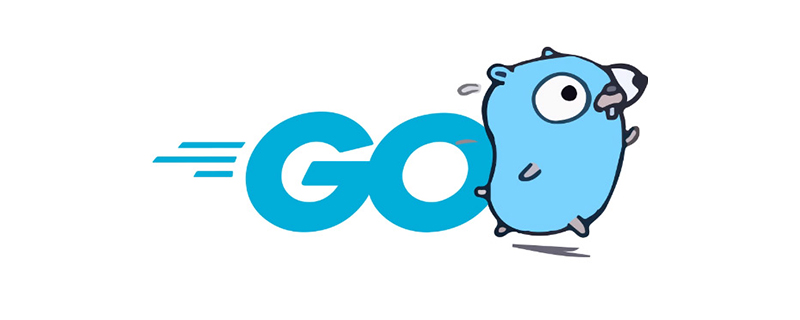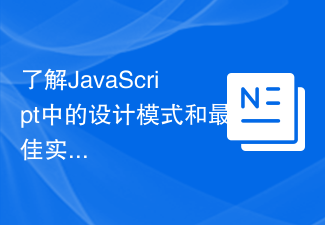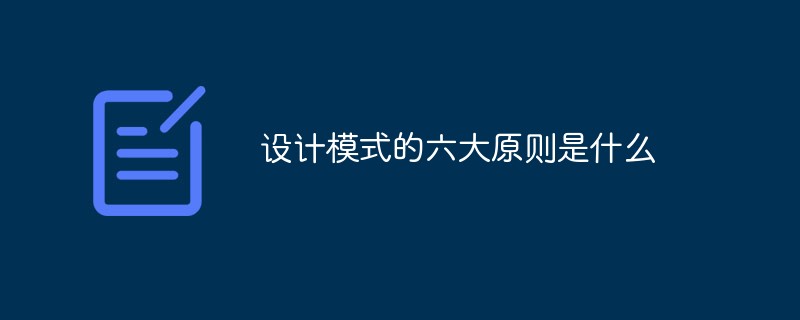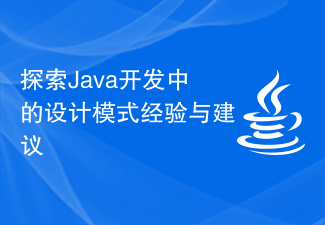 Backend Development
Backend Development PHP Tutorial
PHP Tutorial Sharing a simple method to implement monomorphic design pattern in PHP
Sharing a simple method to implement monomorphic design pattern in PHPThis article mainly introduces the method of simple implementation of monomorphic design pattern in PHP, and briefly analyzes the composition, implementation and use of monomorphic design pattern. Friends in need can refer to it
The examples in this article are described A simple way to implement the monomorphic design pattern in PHP. Share it with everyone for your reference, as follows:
Monomorphic design pattern usually includes the following three points:
· A private constructor; (Ensure that users cannot create objects through It is instantiated)
· A public static method; (responsible for instantiating itself)
· A private static property; (used to save the only instantiated object)
<?php
class singleTon{
//用于保存仅有的一个实例化对象
private static $Instance=NULL;
//构造方法 使用private 封装后 则只能在类的内部使用new去创建对象
private function __construct(){};
//只有通过这个方法才能返回本类中的对象,该方法是静态方法 用类名调用
public static getInstance(){
if(self::$Instance instanceof self){ //如果本类中的$Instance为空,说明还没有被实例化过
self::$Instance=new singleTon(); //实例化本对象
}
return self::$Instance;
}
}
$instance=singleTon::getInstance(); //只能使用静态方法getInstance()去获取singleTon类的对象
?>The so-called monomorphic design pattern is that a class can only produce/create only one object
To To write a monomorphic design pattern, you must make a class can only instantiate one object. If you want a class to be able to instantiate only one object, you must first make a class unable to instantiate objects
The above is the detailed content of Sharing a simple method to implement monomorphic design pattern in PHP. For more information, please follow other related articles on the PHP Chinese website!
 如何在PHP后端功能开发中合理应用设计模式?Aug 07, 2023 am 10:34 AM
如何在PHP后端功能开发中合理应用设计模式?Aug 07, 2023 am 10:34 AM如何在PHP后端功能开发中合理应用设计模式?设计模式是一种经过实践证明的解决特定问题的方案模板,可以用于构建可复用的代码,在开发过程中提高可维护性和可扩展性。在PHP后端功能开发中,合理应用设计模式可以帮助我们更好地组织和管理代码,提高代码质量和开发效率。本文将介绍常用的设计模式,并给出相应的PHP代码示例。单例模式(Singleton)单例模式适用于需要保
 如何通过编写代码来学习和运用 PHP8 的设计模式Sep 12, 2023 pm 02:42 PM
如何通过编写代码来学习和运用 PHP8 的设计模式Sep 12, 2023 pm 02:42 PM如何通过编写代码来学习和运用PHP8的设计模式设计模式是软件开发中常用的解决问题的方法论,它可以提高代码的可扩展性、可维护性和重用性。而PHP8作为最新版的PHP语言,也引入了许多新特性和改进,提供更多的工具和功能来支持设计模式的实现。本文将介绍一些常见的设计模式,并通过编写代码来演示在PHP8中如何运用这些设计模式。让我们开始吧!一、单例模式(Sing
 深入聊聊设计模式利器之“职责链模式”(附go实现流程)Jan 17, 2023 am 11:43 AM
深入聊聊设计模式利器之“职责链模式”(附go实现流程)Jan 17, 2023 am 11:43 AM本篇文章给大家带来了关于golang设计模式的相关知识,其中主要介绍了职责链模式是什么及其作用价值,还有职责链Go代码的具体实现方法,下面一起来看一下,希望对需要的朋友有所帮助。
 Go语言中的ETL的设计模式Jun 01, 2023 pm 09:01 PM
Go语言中的ETL的设计模式Jun 01, 2023 pm 09:01 PM随着数据的增长和复杂性的不断提升,ETL(Extract、Transform、Load)已成为数据处理中的重要环节。而Go语言作为一门高效、轻量的编程语言,越来越受到人们的热捧。本文将介绍Go语言中常用的ETL设计模式,以帮助读者更好地进行数据处理。一、Extractor设计模式Extractor是指从源数据中提取数据的组件,常见的有文件读取、数据库读取、A
 深入解析Go语言中的单例模式Mar 21, 2023 pm 06:36 PM
深入解析Go语言中的单例模式Mar 21, 2023 pm 06:36 PM单例模式是一种常见的设计模式,它在系统中仅允许创建一个实例来控制对某些资源的访问。在 Go 语言中,实现单例模式有多种方式,本篇文章将带你深入掌握 Go 语言中的单例模式实现。
 了解JavaScript中的设计模式和最佳实践Nov 03, 2023 am 08:58 AM
了解JavaScript中的设计模式和最佳实践Nov 03, 2023 am 08:58 AM随着JavaScript的不断发展和应用范围的扩大,越来越多的开发人员开始意识到设计模式和最佳实践的重要性。设计模式是一种被证明在某些情况下有用的软件设计解决方案。而最佳实践则是指在编程过程中,我们可以应用的一些最佳的规范和方法。在本文中,我们将探讨JavaScript中的设计模式和最佳实践,并提供一些具体的代码示例。让我们开始吧!一、JavaScript中
 设计模式的六大原则是什么Jan 06, 2023 pm 04:25 PM
设计模式的六大原则是什么Jan 06, 2023 pm 04:25 PM设计模式的六大原则:1、单一职责原则,其核心就是控制类的粒度大小、将对象解耦、提高其内聚性;2、开闭原则,可以通过“抽象约束、封装变化”来实现;3、里氏替换原则,主要阐述了有关继承的一些原则;4、依赖倒置原则,降低了客户与实现模块之间的耦合;5、接口隔离原则,是为了约束接口、降低类对接口的依赖性;6、迪米特法则,要求限制软件实体之间通信的宽度和深度。
 探索Java开发中的设计模式经验与建议Nov 22, 2023 pm 04:08 PM
探索Java开发中的设计模式经验与建议Nov 22, 2023 pm 04:08 PM探索Java开发中的设计模式经验与建议设计模式是软件开发中用于解决特定问题的一种面向对象的可复用解决方案。在Java开发中,设计模式是很重要的一部分,它能够提高代码的可读性和可维护性,并且能够加速开发过程。通过运用设计模式,开发人员可以更好地组织和管理代码,同时也能够避免一些常见的开发错误。在Java开发中,有很多常用的设计模式,如单例模式、工厂模式、观察者


Hot AI Tools

Undresser.AI Undress
AI-powered app for creating realistic nude photos

AI Clothes Remover
Online AI tool for removing clothes from photos.

Undress AI Tool
Undress images for free

Clothoff.io
AI clothes remover

AI Hentai Generator
Generate AI Hentai for free.

Hot Article

Hot Tools

Dreamweaver Mac version
Visual web development tools

SublimeText3 Chinese version
Chinese version, very easy to use

SAP NetWeaver Server Adapter for Eclipse
Integrate Eclipse with SAP NetWeaver application server.

Safe Exam Browser
Safe Exam Browser is a secure browser environment for taking online exams securely. This software turns any computer into a secure workstation. It controls access to any utility and prevents students from using unauthorized resources.

VSCode Windows 64-bit Download
A free and powerful IDE editor launched by Microsoft





